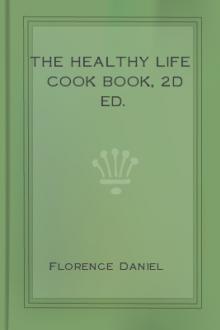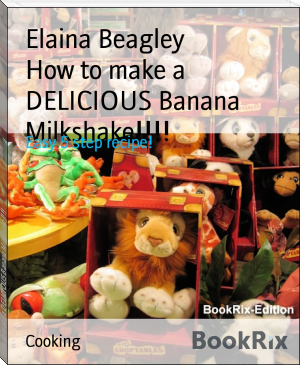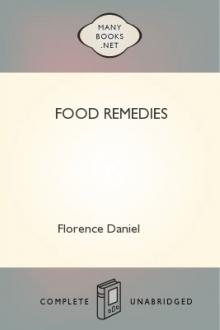The Healthy Life Cook Book, 2d ed. by Florence Daniel (read any book txt) 📕

First put on the chestnuts (without shelling or pricking) in cold water,and boil for an hour. Then remove shells and put the nuts in an enamelledsaucepan with the fat. Fry for 10 minutes. Add the flour gradually,stirring all the time, then add the water. Cook gently for half an hour.Lastly, add the parsley, boil up, and serve.
It is rather nicer if the flour is omitted, the necessary thickness beingobtained by rubbing the soup through a sieve before adding the parsley.Those who do not object to milk may use 1 pint milk and 1 pint water inplace of the 1-1/2 pints water.
5. FRUIT SOUP.
Fruit soups are used extensively abroad, although not much heard of inEngland. But they might be taken at breakfast with advantage by thosevegetarians who have given up the use of tea, coffee and cocoa, and objectto, or dislike, milk. The recipe given here is for apple soup, but pears,plu
Read free book «The Healthy Life Cook Book, 2d ed. by Florence Daniel (read any book txt) 📕» - read online or download for free at americanlibrarybooks.com
- Author: Florence Daniel
- Performer: -
Read book online «The Healthy Life Cook Book, 2d ed. by Florence Daniel (read any book txt) 📕». Author - Florence Daniel
Project Gutenberg's The Healthy Life Cook Book, 2d ed., by Florence Daniel
This eBook is for the use of anyone anywhere at no cost and with almost no restrictions whatsoever. You may copy it, give it away or re-use it under the terms of the Project Gutenberg License included with this eBook or online at www.gutenberg.net
Title: The Healthy Life Cook Book, 2d ed.
Author: Florence Daniel
Release Date: January 8, 2004 [EBook #10632]
Language: English
*** START OF THIS PROJECT GUTENBERG EBOOK THE HEALTHY LIFE COOK BOOK, 2D ED. ***
Produced by Feorag NicBhride and PG Distributed Proofreaders
The Healthy Life Cook Book
by
Florence Daniel
Second Edition
1915
A DELICIOUS PORRIDGE CAN BE MADE BY MIXING ROBINSON'S "PATENT" GROATS "IN POWDER FORM" ::AND:: ROBINSON'S "PATENT" BARLEY "IN POWDER FORM" IN EQUAL PROPORTIONS AND PREPARING IN THE USUAL WAY.Preface
This little book has been compiled by special and repeated request. Otherwise, I should have hesitated to add to the already existing number of vegetarian cookery books. It is not addressed to the professional cook, but to those who find themselves, as I did, confronted with the necessity of manufacturing economical vegetarian dishes without any previous experience of cooking. An experienced cook will doubtless find many of the detailed instructions superfluous.
The original idea was to compile a cookery book for those vegetarians who are non-users of milk and eggs. But as this would have curtailed the book's usefulness, especially to vegetarian beginners, the project was abandoned. At the same time, non-users of milk and eggs will find that their interests have been especially considered in very many of the recipes.
All the recipes have been well tested. Many of them I evolved myself after repeated experiments. Others I obtained from friends. But all of them are used in my own little household. So that if any reader experiences difficulty in obtaining the expected results, if she will write to me, at 3, Tudor Street, London, E.C., and enclose a stamped envelope for reply, I shall be glad to give any assistance in my power.
I desire to record my gratitude here to the friends who have sent me recipes; to the graduate of the Victoria School of Cookery, who assisted me with much good advice; to Cassell's large Dictionary of Cookery, from which I gathered many useful hints; to the Herald of Health, which first published recipes for the Agar-agar Jellies and Wallace Cheese; and to E. and B. May's Cookery Book, from whence emanates the idea of jam without sugar. Lastly, I would thank Mrs. Hume, of "Loughtonhurst," Bournemouth, with whom I have spent several pleasant holidays, and who kindly placed her menus at my disposal.
FLORENCE DANIEL.Preface to Second Edition
This little cookery book was originally published for that "straiter" sect of food-reformers who abstain from the use of salt, yeast, etc. But, owing to repeated requests from ordinary vegetarians, who find the book useful, I am now including recipes for yeast bread, cheese dishes, nutmeat dishes, etc. I have put all these in the chapter entitled "Extra Recipes." To go to the opposite extreme there is a short chapter for "unfired feeders." Other new recipes have also been added.
The note re Salads has been borrowed from E.J. Saxon, and the Vegetable
Stew in Casserole Cookery from R. & M. Goring, in The Healthy Life.
Everyday Fitness
You want food you can eat every day, knowing that it is bringing you nearer and nearer to real Fitness, the Fitness which lasts all day, and survives even Sunday or a Summer Holiday.
'P.R.' Foods are Everyday Foods. They take the place of white bread, and white flour biscuits, of expensive dairy butter, of sloppy indigestible porridge, and so on. They are the Foods which keep you fit all the time—you, and your husband, and the children. They are made along absolutely scientific lines in a factory which is probably unique throughout the world. They are the standard of pure food production. Their daily use is the Direct Route to Fitness All the Time.
You ought to know about them, and try them. Send us *6d.* (P.O. or stamps), and we will post you a splendid lot of samples and a budget of practical information. Do it now.
Or we can send you our Special Trial Parcel, comprising all the principal
'P.R.' Products, carriage paid (in U.K.) for *5/-*.
The Wallace 'P.R.' Foods Co., Ltd., 81, Tottenham Lane. Hornsey. London, N.
* * * * *
*The Finest Coffee the World Produces—
'P.R.' COFFEE*Choicest hill-grown berries, the pick of the world's finest plantations, roasted by Electric Heat. Result: superb favour and freedom from ill effects. Ideal for dyspeptics. Strongly recommended by the Author of this Book. 1-lb. post paid 2/2, or
*Free Sample Canister* (to make 2 cups), from
The Wallace P.R. Foods Co., Ltd., 81, Tottenham Lane, Hornsey,
LONDON, N.[Illustration]
* * * * *
Contents
I. UNFERMENTED BREAD II. SOUPS III. SAVOURY DISHES (AND NUT COOKERY) IV. CASSEROLE COOKERY V. CURRIES VI. VEGETABLES VII. GRAVIES AND SAUCES VIII. EGG COOKERYIX. PASTRY, SWEET PUDDINGS, JELLIES, &c.
X. CAKES AND BISCUITS XI. JAM, MARMALADE, ETC. XII. SALADS, BEVERAGES, ETC. XIII. EXTRA RECIPES XIV. UNFIRED FOOD XV. WEIGHTS AND MEASURES, AND UTENSILS XVI. MENUS, ETC. INDEX* * * * *
_HEALTHY LIFE BOOKLETSBound in Art Vellum. 1 s. net each._
1. THE LEAGUE AGAINST HEALTH. By Arnold Eiloart, B.Sc., Ph.D.
2. FOOD REMEDIES. By Florence Daniel.
3. INSTEAD OF DRUGS. By Arnold Eiloart, B.Sc., Ph.D.
4. THE HEALTHY LIFE COOK BOOK. By Florence Daniel.
5. NATURE VERSUS MEDICINE. By Arnold Eiloart, B.Sc., Ph.D.
6. DISTILLED WATER. By Florence Daniel.
7. CONSUMPTION DOOMED. By Dr. Paul Carton.
8. NO PLANT DISEASE. By Arnold Eiloart, B.Sc., Ph.D.
9. RHEUMATISM AND ALLIED AILMENTS. By Dr. H. Valentine Knaggs.
10. RIGHT DIET FOR CHILDREN. By Edgar J. Saxon.
11. SOME POPULAR FOOD STUFFS EXPOSED. By Dr. Paul Carton.
12. UNFIRED FOOD IN PRACTICE. By Stanley Gibbon.
13. THE TRUTH ABOUT SUGAR. By Dr. H. Valentine Knaggs.
14. HOW THE MIND HEALS AND WHY. By Florence Daniel.
15. OSTEOPATHY. By Florence Daniel.
16. A NEW SUGGESTION TREATMENT. By Dr. Stenson Hooker
17. HEALTH THROUGH BREATHING. By Olgar Lazarus.
18. WHAT TO EAT AND HOW MUCH. By Florence Daniel.
Nos. 14, 15 and 18 are in preparation.
LONDON: C. W. DANIEL, LTD., Graham House, Tudor Street, E.C.
* * * * *
I.—UNFERMENTED BREAD. 1. COLD WATER BREAD.1-1/4 lb. fine wholemeal flour to 3/4 pint water.
Put the meal into a basin, add the water gradually, and mix with a clean, cool hand. (Bread, pastry, etc., mixed with a spoon, especially of metal, will not be so light as that mixed with a light cool hand.) Knead lightly for 20 minutes. (A little more flour may be required while kneading, as some brands of meal do not absorb so much water as others, but do not add more than is absolutely necessary to prevent the fingers sticking.) Put the dough on to a floured board and divide into four round loaves. Prick with a fork on top.
The colder the water used, the lighter the bread, and if the mixing be done by an open window so much the better, for unfermented bread is air-raised. Distilled or clean boiled rain-water makes the lightest bread. But it should be poured backwards and forwards from one jug to another several times, in order to aerate it.
Another method of mixing is the following:—Put the water into the basin first and stir the meal quickly into it with a spatula or wooden spoon. When it gets too stiff to be stirred, add the rest of the meal. Knead for two minutes, and shape into loaves as above.
BAKING.—Bake on the bare oven shelf, floored. If possible have a few holes bored in the shelf. This is not absolutely necessary, but any tinker or ironmonger will perforate your shelf for a few pence. Better still are wire shelves, like sieves. (This does not apply to gas ovens.)
Start with a hot oven, but not too hot. To test, sprinkle a teaspoonful of flour in a patty pan, and put in the oven for five minutes. At the end of that time, if the flour is a light golden-brown colour, the oven is right. Now put in the bread and keep the heat of the oven well up for half an hour. At the end of this time turn the loaves. Now bake for another hour, but do not make up the fire again. Let the oven get slightly cooler. The same result may perhaps be obtained by moving to a cooler shelf. It all depends on the oven. But always start with a hot oven, and after the first half hour let the oven get cooler.
Always remember, that the larger the loaves the slower must be the baking, otherwise they will be overdone on the outside and underdone in the middle.
Do not open the oven door oftener than absolutely necessary.
If a gas oven is used the bread must be baked on a baking sheet placed on a sand tin. A sand tin is the ordinary square or oblong baking tin, generally supplied with gas stoves, filled with silver sand. A baking sheet is simply a piece of sheet-iron, a size smaller than the oven shelves, so that the heat may pass up and round it. Any ironmonger will cut one to size for a few pence. Do not forget to place a vessel of water (hot) in the bottom of the oven. This is always necessary in a gas oven when baking bread, cakes or pastry.
It must not be forgotten that ovens are like children they need understanding. The temperature of the kitchen and the oven's nearness to a window or door will often make a difference of five or ten minutes in the time needed for baking. One gas oven that I knew never baked well in winter unless a screen was put before it to keep away draughts!
ROLLS.—If you desire to get your bread more quickly it is only a question of making smaller loaves. Little rolls may be cut out with a large egg-cup or small pastry cutter, and these take any time from twenty minutes to half an hour.
2. EGG BREAD.9 ozs. fine wholemeal, 1 egg, a bare 1/2 pint milk and water, butter size of walnut.
Put butter in a qr. qtn. tin (a small square-cornered tin price 6-1/2d. at most ironmongers) and let it remain in hot oven until it boils. Well whisk egg, and add to it the milk and water. Sift into this liquid the wholemeal, stirring all the time. Pour this batter into the hot buttered tin. Bake in a very hot oven for 50 minutes, then move to a cooler part for another 50 minutes. When done, turn out and stand on end to cool.
3. GEM BREAD.Put into a basin a pint of cold water, and beat it for a few minutes in order to aerate it as much as possible. Stir gently, but quickly, into this as much fine wholemeal as will make a batter the consistency of thick cream. It should just drop off the spoon. Drop this batter into very hot greased gem pans. Bake for half an hour in a hot oven. When done, stand on end to cool. They may appear to be a little hard on first taking out of the oven, but when cool they should be soft, light and spongy. When properly made, the uninitiated generally refuse to believe that they do not contain eggs or





Comments (0)